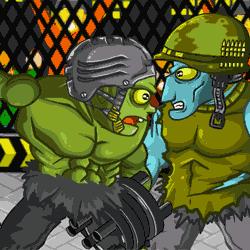What are Fighting Games?
Fighting games are a genre of video games where players control characters who engage in close combat with one another. The primary objective is to deplete the opponent's health bar using a combination of punches, kicks, special moves, and other fighting techniques. These games often feature a variety of characters, each with unique abilities and fighting styles, and are typically set in diverse environments or arenas.
How To Win Fighting Games?
Winning fighting games requires a blend of skill, strategy, and knowledge of the game mechanics. Here are some key strategies to help you improve and increase your chances of victory:
Master the Basics
Start by mastering the basic controls and moves of the game. This includes understanding how to perform basic attacks, blocks, and movement. Spend time in the training mode to get a feel for your character’s move set and how they respond in different situations. Practice executing simple combos and learn how to string together moves to maximize damage. Familiarity with your character’s strengths and weaknesses is crucial for effective combat.
Learn Combos and Special Moves
Combos and special moves are essential for dealing significant damage to your opponent. Each character has unique combinations of attacks that can be chained together for maximum effect. Spend time learning and practicing these combos in training mode until you can perform them consistently. Special moves often require specific inputs, so memorizing and mastering these techniques can give you an edge in battle. Knowing when and how to use these moves strategically can turn the tide of a match.
Understand Game Mechanics and Strategy
Each fighting game has its own set of mechanics and rules that can influence your strategy. Study the game’s mechanics, such as the guard system, frame data, and hitboxes. Understanding these elements can help you predict your opponent’s moves and react accordingly. Additionally, develop a strategy based on your character’s strengths. Adapt your strategy based on your opponent’s playstyle and exploit their weaknesses.
Defense and Counterplay
Defense is just as important as offense in fighting games. Learn to block effectively to reduce incoming damage and avoid being hit by powerful attacks. Practice techniques like teching throws and countering attacks to keep your opponent off balance. Anticipate your opponent’s moves and look for openings to counterattack. Patience and timing are key; sometimes, waiting for your opponent to make a mistake can create an opportunity for a decisive counter.
Study and Practice
To truly excel in fighting games, continuous practice and studying are essential. Watch replays of your matches to identify areas for improvement and learn from your mistakes. Study high-level play by watching tournaments and matches of top players. Analyze their strategies, decision-making, and execution. Incorporate what you learn into your gameplay and consistently practice to refine your skills.










 Parking Games
Parking Games Sweets Games
Sweets Games Fidget Spinner Games
Fidget Spinner Games Wheely Games
Wheely Games Money Movers Games
Money Movers Games Cool Games
Cool Games Basketball Games
Basketball Games Atari Games
Atari Games Drawing Games
Drawing Games 8 Ball Pool Games
8 Ball Pool Games Microsoft Games
Microsoft Games Quiz Games
Quiz Games Monkey Games
Monkey Games Football Games
Football Games Archery Games
Archery Games Moto X3M Games
Moto X3M Games Mahjong Games
Mahjong Games Matching Games
Matching Games